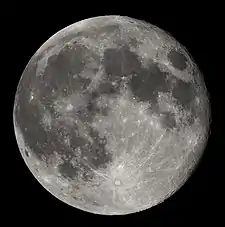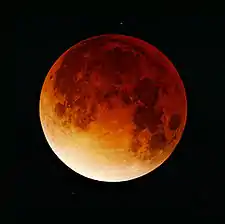Mond
Alemannic German
Alternative forms
- Mann, manä, meini, manòd, mànund
Etymology
From Old High German māno, from Proto-Germanic *mēnô. Cognate with German Mond, English moon, Icelandic máni, Gothic 𐌼𐌴𐌽𐌰 (mēna).
Noun
Mond m
- moon
Central Franconian
Alternative forms
- Muund (rare variant in Moselle Franconian)
Etymology
From a conflation of Old High German māno (from Proto-Germanic *mēnô) and mānōd (from Proto-Germanic *mēnōþs), both from Proto-Indo-European *mḗh₁n̥s.
Pronunciation
- IPA(key): /mɔːnt/
Noun
Mond m (plural Mond or Monde)
- (most dialects) moon
- Wa’ mer naachs em Bösch es, süht mer, wie hell der Mond schengk.
- When you’re in the forest at night, you see how bright the moon shines.
- (most dialects) month
- Ich hann ald drei Mond nur der halve Luhn jekräje.
- I’ve been paid just half my salary for three months now.
German


Etymology
From Middle High German māne, from Old High German māno, from Proto-West Germanic *mānō. Later forms of the Middle High German word, mānde, had a final dental due to confusion with mānōt (“month”) (modern Monat).
See also Dutch maan, English moon, Swedish måne, Icelandic máni); also Monat.
Further Indo-European cognates: Latin mēnsis (“month”), Ancient Greek μήν (mḗn, “month”), Sanskrit मास (māsa, “moon”), Russian месяц (mesjac, “moon; month”), Lithuanian mėnulis, Persian ماه (māh, “moon, month”), Tocharian A mañPronunciation
- IPA(key): /moːnt/
audio (Germany) (file) audio (Austria) (file)
Proper noun
der Mond m (proper noun, strong, usually definite, definite genitive des Mondes or des Monds)
- (astronomy) the Moon; Earth's only natural satellite, and also a luminary
- Der Mond ist so massereich, dass Erde und Mond zusammen häufig als Doppelplanet bezeichnet werden.
- The Moon has such an enormous mass that Earth and Moon are often considered as a binary system.
Declension
| singular | ||
|---|---|---|
| def. | noun | |
| nominative | der | Mond |
| genitive | des | Mondes, Monds |
| dative | dem | Mond, Monde1 |
| accusative | den | Mond |
1Now uncommon, see notes.
Noun
Mond m (strong, genitive Mondes or Monds, plural Monde)
- (astronomy) moon (a natural satellite that is orbiting its corresponding planet)
- Ganymed ist der größte Mond des Sonnensystems.
- Ganymede is the biggest moon of the Solar System.
- Merkur und Venus haben keine natürlichen Monde.
- Mercury and Venus do not possess natural moons.
- (literary, dated) a month, especially a lunar month
- (heraldry) moon (often used to describe a crescent)
Declension
| singular | plural | ||||
|---|---|---|---|---|---|
| indef. | def. | noun | def. | noun | |
| nominative | ein | der | Mond | die | Monde |
| genitive | eines | des | Mondes, Monds | der | Monde |
| dative | einem | dem | Mond, Monde1 | den | Monden |
| accusative | einen | den | Mond | die | Monde |
1Now uncommon, see notes.
Old Declension: This old declension is not used anymore, but was up until the end of the 18th century.
| singular | plural | ||||
|---|---|---|---|---|---|
| indef. | def. | noun | def. | noun | |
| nominative | ein | der | Mond | die | Monden |
| genitive | eines | des | Monden | der | Monden |
| dative | einem | dem | Monden | den | Monden |
| accusative | einen | den | Monden | die | Monden |
Synonyms
- (Earth's moon): Luna
- (any moon): Trabant m, Satellit m
Hypernyms
- Himmelskörper m
Hyponyms
- Halbmond m
- Neumond m
- Vollmond m
Derived terms
- Blutmond
- Dreiviertelmond
- Halbmond
- Mondaufgang
- Mondauto
- Mondfähre
- Mondfahrzeug
- Mondfinsternis
- Mondfisch
- Mondgesicht
- Mondkalender
- Mondlandschaft
- Mondlandschaft
- Mondlandung
- mondlos
- Mondschein
- Mondsichel
- mondsüchtig
- Monduntergang
- Neumond
- Vollmond
Related terms
- Monat m
- Montag m
See also
- Satellit m
- Trabant m
Further reading
- “Mond” in Digitales Wörterbuch der deutschen Sprache
- “Mond” in Uni Leipzig: Wortschatz-Lexikon
- “Mond” in Duden online
 Mond on the German Wikipedia.Wikipedia de
Mond on the German Wikipedia.Wikipedia de
Hunsrik
Etymology
From Middle High German māne, from Old High German māno.
Pronunciation
- IPA(key): /moːnt/
Noun
Mond m (plural Monde or Mone)
- moon
Further reading
- Online Hunsrik Dictionary
Luxembourgish
Etymology
From Old High German mund.
Pronunciation
- IPA(key): /mont/
Noun
Mond m (plural Mënner)
- mouth